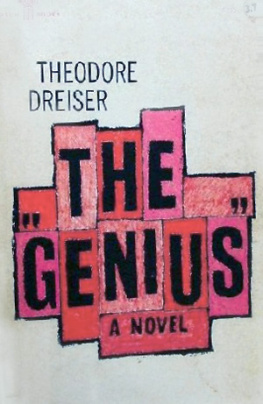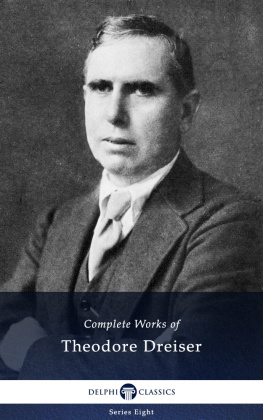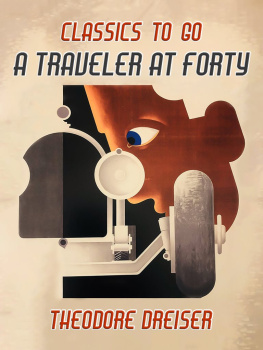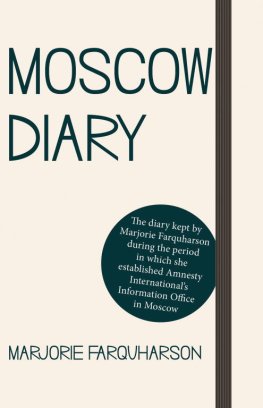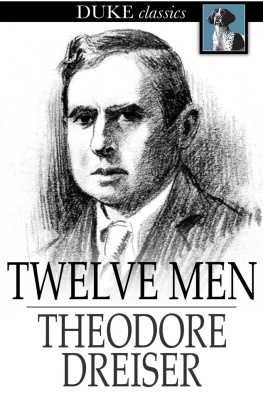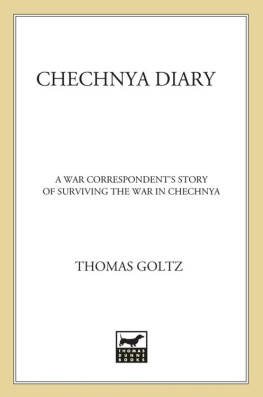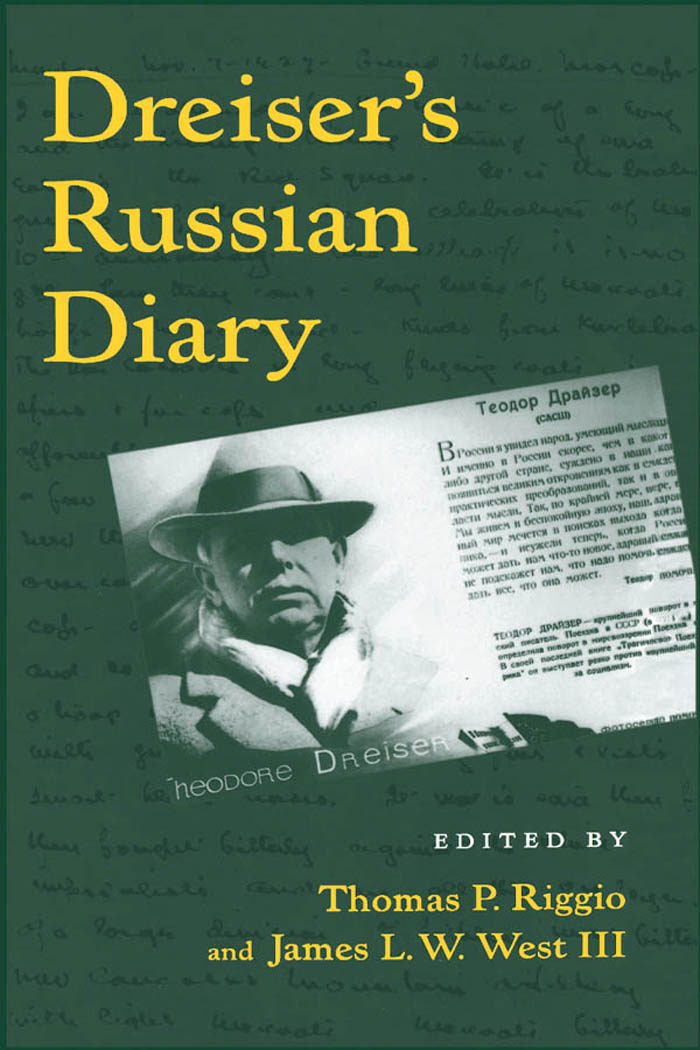
DREISERS
RUSSIAN
DIARY

The University of Pennsylvania
Dreiser Edition
THOMAS P. RIGGIO
General Editor
JAMES L. W. WEST III
LEE ANN DRAUD
Textual Editors

DREISERS
RUSSIAN
DIARY

Edited by
THOMAS P. RIGGIO
JAMES L. W. WEST III
PENN
University of Pennsylvania Press
Philadelphia
Copyright 1996 by the University of Pennsylvania Press
All rights reserved
Library of Congress Cataloging-in-Publication Data
Dreiser, Theodore, 1871-1945.
Dreisers Russian diary / edited by Thomas P. Riggio, James L. W. West, III.
p. cm. (University of Pennsylvania Dreiser edition)
Includes index.
ISBN 0-8122-8091-1 (alk. paper)
1. Soviet UnionDescription and travel. 2. Dreiser, Theodore, 1871-1945Journeys
Soviet Union. I. Riggio, Thomas P. II. West, James L. W. III. Title. IV. Series: Dreiser,
Theodore, 1871-1945. University of Pennsylvania Dreiser edition.
DK27.D73 1996
914.704842-dc20
96-20778
CIP
Research for this publication was supported by a grant from the International
Research and Exchanges Board, with funds provided by the U. S. Department
of State (Title VIII) and the National Endowment for the Humanities. None
of these organizations is responsible for the views expressed.
Printed in the United States of America
For
Anna, Tommy, and Rob
CONTENTS
ILLUSTRATIONS
PREFACE
On 3 October 1927, Theodore Dreiser received an invitation from the Soviet government to travel to Moscow for the celebration of the tenth anniversary of the Russian Revolution. On that day he began writing a diary that he would finish on 13 January 1928, when he had come to the end of a lengthy tour of Russia. In Moscow he met Ruth Epperson Kennell, who, as his secretary and companion for the trip, contributed significantly to the composition of the diary.
Dreisers careful preservation of his papers makes possible this first publication of the Russian Diary of 192728. It is a document that will be of special value to anyone interested in American and Russian history in the twentieth century. During his stay in the former Union of Soviet Socialist Republics, Dreiser kept the diary to provide a record of the conversations he had with many of that countrys most famous cultural and political figures: Sergei Eisenstein, Konstantin Stanislavsky, Anastas Molotov, Vladimir Mayakovsky, Karl Radek, Nikolai Bukharin, and Archbishop Platon, among others. These exchanges and Dreisers firsthand account of conditions in the Soviet Union during the pivotal years of the late 1920s make the diary an important primary source and among the last such historical documents from this era.
This volume continues the Pennsylvania Dreiser Editions tradition of publishing authoritative texts of writings that either survive only in manuscript or are otherwise inaccessible to both the specialist and the general reader. Such an undertaking would be unimaginable without the goodwill of the administration and the special training of the staff at the Van Pelt-Dietrich Library Center of the University of Pennsylvania. Paul H. Mosher, Director of Libraries at the university, has provided continuing support to the Dreiser Project. Michael T. Ryan, Director of Special Collections at the library, has generously devoted his own time and the resources of his staff to facilitating the work of the Dreiser Edition. The reorganization of the Dreiser Collection by Curator of Manuscripts Nancy Shawcross has made easier the preparation of this book and of others in progress.
Together with the Pennsylvania Edition of Dreisers American Diaries, 19021926 (1982) and An Amateur Laborer (1983), this edition of the Russian Diary is one of a projected series of volumes that will provide scholarly texts of Dreisers private papers. Because Dreiser never prepared this diary for publication, it has been presented in conformity with widely accepted principles governing the editing of private documents. The editors, Thomas P. Riggio and James L. W. West III, conceived the volume and shared equally in the verification of the text and the writing of the annotations and identifications. Riggio provided the Introduction and West the Editorial Principles and apparatus. The editors, and associate editor, Lee Ann Draud, proofread the text and verified the contents at each stage of preparation.
THOMAS P. RIGGIO
General Editor
The University of Pennsylvania
Dreiser Edition
ACKNOWLEDGMENTS
For permission to publish the text of Dreisers Russian Diary, the editors are grateful to the Trustees of the University of Pennsylvania, who hold copyright on Dreisers unpublished writings. The editors thank Arthur D. Casciato, who produced an initial transcription of the diary that was a helpful starting point for our work. Thanks also to Stephen F. Cohen and Rosemarie Reed for their generosity in providing information about and photographs of Nikolai Bukharin.
Professor Riggio wishes to thank Jay West and Marina Tchebotaeva for help in verifying Russian spelling and identifying Russian place names, events, and geographical features. He would also like to acknowledge Irena Kutkina, whose aid as translator and guide in the Russian archives, as well as at the sites that Dreiser had visited, made his stay in Russia both more profitable and more enjoyable. Special thanks also to Drs. Eleonora A. Kravchenko and Alexandro Kutkina of Moscow for their generous hospitality and aid in matters large and small. Professor West thanks LaVerne Kennevan Maginnis for assistance with the textual chores; he is grateful to Flora Buckalew, Kim Fisher, and Suzanne Marcum for much help with the annotations.
INTRODUCTION
Russia would make a most delightful socialistic community if the Emperor could be suddenly done away with and the people as suddenly educated. The Government controlling everything, it would only be necessary to transfer the control to the peoples choice and you would have a kind of Utopia. The thing might be worked inversely and a fine socialistic community transformed into the most despotic form of government, with the reins all in one mans hands, but that would not be likely to happen where people have once gained any kind of an intellectual status.
Dreiser, at age 22, in the St. Louis Globe-Democrat,
2 January 1893
On 10 January 1928 Theodore Dreiser found himself making his way through the cold of a Russian winter day in the Ukrainian city of Odessa, an industrial center on the Black Sea near the mouth of the Dnieper River. He was ending a strenuous two months visit to the former Union of Soviet Socialist Republics and was having difficulty getting a visa to travel through Poland to western Europe. To his dismay, customs agents told him that he needed special permission to take manuscripts and printed matter out of the country. He was most concerned about a diary that he had kept since 3 October 1927, when he first learned of the Soviet governments offer of an all-expenses-paid trip to Moscow. On that day he began his handwritten diary as a record of his experiences and reflections, beginning in New York and continuing aboard ship, and while traveling through Europefirst to Paris, then to Berlin and Warsaw, and finally into Russia.


